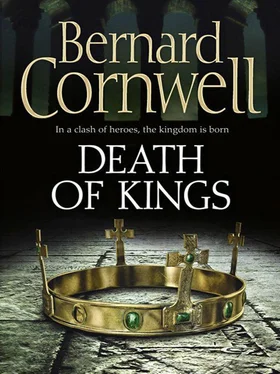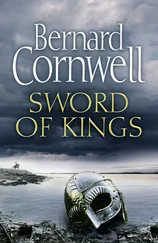I thought that was strange as I followed Æthelwold through the night. The Christians say that our punishment is hell and the Danes say that those who die badly go to Hel where the goddess of the same name rules. Hell and Hel sound the same, yet they are not the same. Hel is not hell. Hel does not burn people, they just live in misery. Die with a sword in your hand and you will never see Hel’s decaying body or feel hunger in her vast cold caverns, but there is no punishment about Hel’s domain of Hel. It is just ordinary life for ever. The Christians promise punishment or reward as if we are small children, but in truth what comes after is just what went before. All will change, as Ælfadell had told me, and all will be the same as ever it was and ever shall be. And remembering Ælfadell made me think of Erce, of that slim body undulating on mine, of the guttural sounds she had made, of the memory of joy.
Dawn brought the sound of stags roaring. This was the rutting season when starlings blacken the sky and the leaves begin to fall. I paused my tired horse at a rise in the road and looked about me, but saw no one. I seemed to be alone in a misted dawn, suspended in a gold and yellow world that was silent except for the roar of the stags, and even that sound vanished as I looked eastwards and southwards for any sign of Edward’s men, but still saw nothing. I kicked the horse on north towards the smoke-smear in the sky that betrayed the town of Sceaftesburi beyond the hills.
Sceaftesburi was one of Alfred’s burhs, a fortress town that protected both a royal mint and a nunnery that had been beloved of Alfred. Æthelwold would never dare demand entrance to such a town, or risk waiting for its gates to open so that he could ride through the streets. The burh’s commander, whoever he was, would be too curious, which meant Æthelwold must have circled Sceaftesburi. But which way? I searched for tracks and saw nothing obvious. I was tempted to abandon the pursuit, which had been a foolish idea in the first place. I wanted to find a tavern in the burh and eat a meal and find a bed and pay a whore to warm it, but then a hare ran across my path, east to west, and that was surely a sign from the gods. I turned west off the road.
And moments later the mist cleared and I saw the horses on a chalk hill. Between me and the hill was a wide, thickly wooded valley and I spurred into it even as I saw the horsemen had noticed me. They were in a group, staring my way and I saw one point at me, then they turned and went on northwards. I counted only nine men, yet surely it had to be Æthelwold, but once I dropped into the trees I could not look for the remaining horsemen because the mist thickened here and I had to go slowly because the branches dipped low and I needed to duck. Ferns grew thick. A small stream tumbled across my path. A dead tree was layered with fungi and moss. Brambles, ivy and holly choked the undergrowth either side of the path, a path pocked with fresh hoof-prints. It was silent among the trees and in the silence I felt the fear, the prickling, the knowledge born of nothing but experience that danger was close.
I dismounted and tied the horse’s reins to an oak. What I should do, I thought, was remount the horse and ride straight to Sceaftesburi and raise the alarm. I should requisition a fresh horse and lead the garrison’s men in pursuit of Æthelwold, but to do that was to turn my back on whatever threatened me. I drew Serpent-Breath. There was comfort in the feel of her familiar hilt.
I walked on, slowly.
Had the horsemen on the hill seen me before I saw them? That seemed likely. I had been lost in thought as I followed the road, half dreaming, half thinking. Suppose they had seen me? They knew I was alone, they probably knew who I was, and I had only seen nine men, which suggested the others had been left in the wood to ambush me. So go back, I told myself, go back and rouse the burh’s garrison, and just as I had decided that was both my duty and the prudent thing to do, two horsemen burst out of cover fifty paces away and charged up the path towards me. One carried a spear, the other a sword. Both had helmets with face-plates, both were in mail, both had shields, and both were fools.
A man cannot fight on horseback in a deep, old wood. There are too many obstacles. They could not ride abreast because the path was too narrow and the undergrowth too thick on either side, and so the spearman led and he, like his companion, was right-handed, which meant the spear was on the right side of his tired horse and to my left. I let them come, wondering why only two were attacking, but put that mystery to one side as they got close and I could see the man’s eyes in the slit of his helmet, and I simply stepped to my right, into brambles and behind an oak’s trunk and the spearman galloped past helplessly and I stepped back out and swung Serpent-Breath with all my strength so that she slammed the second horse in the mouth, splintering teeth and scattering blood and the beast screamed and swerved and the rider was falling, tangled in the reins and stirrups as the first man tried to turn.
‘No!’ a voice shouted from deeper in the trees. ‘No!’
Was he talking to me? Not that it mattered. The swordsman was on his back now, struggling to rise, while the spearman was struggling to turn his horse on the narrow path. The swordsman’s shield was looped to his left forearm so I simply stood on the willow boards, trapping him, and plunged Serpent-Breath down. Hard down. Once.
And there was blood in the leaf-mould and a choking sound and a body shaking beneath me and a dying man’s sword arm going limp as the spearman kicked his horse back towards me. He lunged with the spear, but it was simple to avoid by swaying to one side and I seized the ash shaft and tugged hard and the man had to let go or else be pulled from the saddle, and his horse was backing away as the rider tried to draw his sword and he was still trying when I slid Serpent-Breath up his right thigh, beneath his mail, opening his skin and muscle with her point and edge and then finding the bone of his hip and thrusting harder and shouting with all my breath to scare him and to give the lunge force. The sword was in his body and I was grinding it, turning it, pushing it, and the voice from deep in the wood shouted again, ‘No!’
But yes. The man had half drawn his sword, but the blood was dripping from his boot and stirrup and I simply caught his right elbow with my left hand and pulled so that he came off his horse. ‘Idiot,’ I snarled at him, and killed him as I had killed his companion, then turned fast towards the place from where the voice had sounded.
Nothing.
Somewhere far off a horn sounded, then was answered by another. The sounds came from the south and told me Edward’s forces were coming. A bell began to toll, presumably from Sceaftesburi’s convent or church. The wounded horse whinnied. The second man died and I pulled Serpent-Breath’s tip from his throat. My boots were dark with new blood. I was tired. I wanted that meal and bed and whore, but instead I walked down the path towards the place where the two fools had come from.
The path turned where thick foliage screened the view, then it opened into a glade around a wide stream. The day’s first sunlight flickered through leaves to make the grass very green. There were daisies in the grass and Sigebriht was there with three men and with Æthelflaed, all of them mounted. It was one of these men who had shouted at his two dead companions, but which man, or why, I could not tell.
I walked out of the shadow. The helmet’s face-plates were closed, my mail and boots were blood-spattered, Serpent-Breath was reddened. ‘Who’s next?’ I asked. Æthelflaed laughed. A kingfisher, all red and blue and bright, darted down the stream behind her and vanished in the shadows. ‘Lord Uhtred,’ she said, and kicked her heels so that her horse came towards me.
Читать дальше
Конец ознакомительного отрывка
Купить книгу












